How Age of Empires III deals with its own complicated history
Empire rebuilding

Age of Empires III: Definitive Edition was released on October 15 on Steam, Windows Store, and Xbox Game Pass Ultimate, and Microsoft Xbox Games Studios have given us a more than just remastered classic.
From visual updates to changes to civilizations, there's a lot to get your teeth into for both old fans and newcomers. There are many new changes, including two new civs, and changes to the user interface and voice lines and animations. However, some of these changes have been controversial, namely those to the original's sometimes problematic depictions of its civilizations.
In case you're new to Age of Empires, it is a real-time strategy game franchise originally developed by Ensemble Games. It includes Age of Empires, Age of Empires II: The Age of Kings (AoE2), and Age of Empires III (AoE3). Age of Mythology is also part of the series, set during the same time period of Age of Empires, but in a mythical world.
In each of them you must destroy your opponent's city while building an economy, city, and army to lead you to victory. There is a single player campaign, player vs AI, or PVP skirmishes.
AoE3 was much like its predecessors but in other ways quite unlike them. It was the first in the series to be in 3D, and had vastly improved graphics from its predecessors.
It split the community, with some feeling its changes to units and the economy made it too far removed from the franchise's original style and gameplay, but it was still very successful despite this.
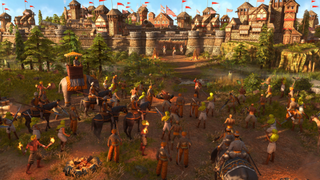
Joining Microsoft
In 2001 Ensemble Studios was acquired by Microsoft and later disbanded in 2009. Microsoft, through its Xbox Games Studios division, then partnered with Forgotten Empires, Tantalus Media and Microsoft subsidiary World’s Edge Games Studios (formed specifically to focus on AoE) and began work on the franchise.
Get daily insight, inspiration and deals in your inbox
Get the hottest deals available in your inbox plus news, reviews, opinion, analysis and more from the TechRadar team.
The Definitive Editions are remastered versions of the originals, improving on things like the graphics and UI, as well as adding new content, while maintaining the essence of the classic games that we know and love.
We spoke to Adam Isgreen, studio Creative Director for World’s Edge, about the evolution of the franchise.
"It's been an amazing journey going through all of the games that we've done so far, really diving into each of the different communities," he told us.
"[They] can be very different for each game. Everyone loves some of the games, specific games, and it was fun to try to understand what each of them really loved and wanted in a modern Age of Empires."
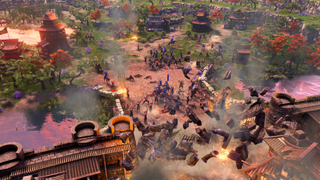
Unwelcome changes
However, Age of Empires III had its fair share of controversies upon its original release. It introduced the Home City, which allowed for more strategy and customization to your civ. Farms and mines now infinitely produced products without any player input, a feature that would partially make its way to AoE2: Definitive Edition in how it allows you to toggle farms to automatically rebuild after they become fallow.
Military units were different, and the unique civ bonuses along with the specific civ’s content meant you had to learn entirely different approaches to each game based on which one you played. The infinite food and gold meant you could concentrate on military power without having to worry about running out of resources.
For some, it was a turn-off. They felt it made the game easier, while still being unnecessarily complicated. Ensemble simply wanted more innovative gameplay, while not losing the core of the game. Some feel it did not achieve that, but it didn't mean it wasn't a good game in its own right.
AoE3 is in fact a great game, but it just didn't feel an authentic enough Age game for some of the fans, and even now is beaten by AoE2 in popularity.
Many of the Definitive Edition's changes can be toggled off. In fact, there are "default", "definitive" and "classic" options to choose from when customizing hotkeys and UI. There are accessibility options that allow you to customize colors, especially handy for color blind players.
Bert Beeckman, co-founder of Forgotten Empires, says: "We wanted to add a lot of things to the game, a lot of new UI options and every time we were like, OK, we have the old version working; let's just keep that in and make it an option. Then people have the choice. For every option we added, there was a legacy option. If you've had the same hotkeys for fifteen years, you don't just relearn them."
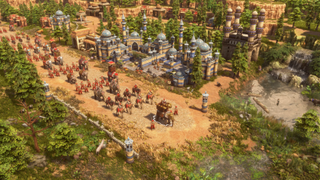
Past mistakes
Age of Empires 3 also caused controversy with its RTS-style-campaign plot, which ignored dark and shameful aspects of the time period it covered, like the transatlantic slave trade. This was something that the team behind the Definitive Edition felt they needed to address.
Let's look at the representation changes. In the Native American tribes, the Sioux have been renamed the Lakota, the Iroquois the Haudenosaunee. The Discovery Age is now called the Exploration Age, and the Colonial Age is now the Commerce Age – this last change being one of the most controversial.
The Firepit has now been renamed to the Community Plaza and the dances performed on them are now referred to as ceremonies and have had a visual and animation adjustment.
"Well, colonialism was a policy," Adam says. "The age had always been referred to as Age of Discovery or Age of Adventure. This is where we have to walk a line between what do we think makes sense and what do we think is the right thing to do for a broader spectrum of people? I mean, bad things happened during colonial times. South America and the Americas just got decimated by these other civilizations coming in.
"At one point we were like, we don't wanna sugarcoat it. But we wanna make sure it's open for people that are playing where those cultures were, and it doesn't feel like we're punishing them for playing the game. So, yeah, this is where we're gonna keep walking that line."
Flags, units, and buildings have been renamed or tweaked to be historically considerate and accurate. So, plantations are now being named estates, and the German flag is now actually the German flag, rather than Prussian, as it was in the original game. These are welcome changes, but it's still unclear why some flags and civilizations have been changed while others haven't.
But, some fans feel the changes are a political move or an example of 'political correctness gone wrong' tyranny. AoE3 takes place during the colonial age, and, ultimately, the aim of the game is colonization, so why rewrite history?
"How are we going to talk about things that are really hard to talk about?"
Adam Isgreen, Creative Director
“What we really wanted to do was set the studio off on the right foot,” says Adam, “because we knew we're dealing with history and there are some really bad things that have happened throughout all of the different eras that humans have been around. There's been wonderful good balanced with really bad things and we knew we were going to run into them. We were like, how are we going to talk about things that are really hard to talk about? I mean, how are we gonna make sure that we're accurate?”
Many of the depictions of civilizations, historical leaders, and other characters from the original game have dated badly, to say the least. It would be fair to say the depiction of the Native American tribes were particularly offensive and really couldn’t fly in the more culturally conscious society we live in today.
“As we started digging into it,” says Adam, “and really embracing the idea that we were going to respect the cultures, we were like, you know all of the Native Americans, there's something wrong here. We just can't do it, it doesn’t look right. There came a point where we were actually considering not shipping it. We were like – we're just not, we're not gonna ship this Definitive Edition, because we were so worried about the portrayal of the cultures.”
"There came a point where we were actually considering not shipping [the game]... because we were so worried about the portrayal of the cultures"
The time in which AoE3 was made was indeed a different one, and what was socially acceptable or could be ignored then would be considered wilful ignorance today. The depiction of native tribes in AoE3 was straight out of an old Hollywood Western – not the best point of reference for any type of historical accuracy; more an advert for what not to do.
“We talked about it a lot,” says Adam, “and [we decided] that the right thing to do is represent these cultures as accurately as we can. We're failing ourselves and we're failing our fans if we don't do this. There's so many people who’ve come up to me through the years at Gamescon and E3 … and they're like – oh my god – ‘I learned history from Age of Empires.’ And I'm like, oh boy. OK, we need to be a lot more serious about this.”
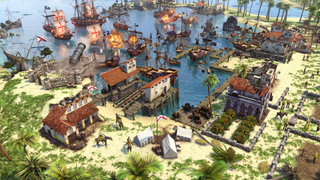
Setting the record straight
When you first get into the game, you’re met with a message from the dev team, which we reproduce in full:
To learn from the power of our own stories is uniquely human. At World’s Edge, we value authenticity and respectful representations grounded in truth. The original release of Age of Empires III took liberties with the depiction of Indigenous civilisations, as well as the depiction of events and personages from American history. As we developed the Age of Empires III: Definitive Edition, we collaborated with Native American and First Nations consultants to correct these errors.
We are immensely grateful for the time, patience, and faith shown to us by the members of the Lakota and Haudenosaunee Nations. We have replaced inaccurate or stereotypical depictions, created new voiceover using authentic speakers, and addressed problematic and harmful mechanics and storylines. We hope that you, the Age III DE player, will join us in celebrating the rich and vibrant cultures represented in the game. We have increased our resolve going forward to live out the values of “Gaming for Everyone” – a commitment to a journey, not a destination.
Despite this heartening message, some fans feel this is still unforgivable and is not sticking with history, arguing that Xbox Game Studios should not try to rewrite it, while simultaneously asking it to leave the cultural inaccuracies in because, well, it’s a game and it’s not meant to teach you history. That’s definitely a pretty sticky predicament to be in.
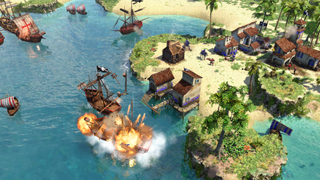
But, in the original game, native tribes danced around a fire pit to strengthen their army and gain power, while the Western civilizations used logistics and technological advancements to gain theirs. That’s clearly an unacceptable representation of the native tribes that’s both inaccurate and offensive. It was clear that the team had to change this.
“When we were working on Killer Instinct, doing Native American characters there, there's like 3,000 people left in that first tribe that would understand what we could do with our characters that we put in that game. So sometimes there's a timing element to making sure that we are accurate in history. You'll see this more as we do other games, especially Age of Empires 4, where we take a lot of steps to not only embrace the cultures but to use historians and representatives from those cultures in order to actually get them as authentic as we can get them.”
We think Age of Empires III has indeed got a troubled past, and the Definitive Edition has tried to right some of those wrongs, an almost impossible task when trying to consider the often contradictory interests and desires of its community as a whole.
But the willingness to work on creating a more accurate representation of civilizations and its history – even going as far as to have direct input from individuals of these cultures – is certainly a step in the right direction. Developers can’t get everything right, and often they’re damned if they do, damned if they don’t.
But what is truly important is that they’re earnestly striving to balance being culturally sensitive and delivering a great game that maintains the Age of Empires legacy. So far, we think Xbox game studios and its partners have managed to do just that.
- Curious to know a little more about the upcoming Age of Empires 4?
Rosario Blue is a writer, playwright, and freelance journalist.
She is a Global Goodwill Ambassador for Postcards for Peace.

